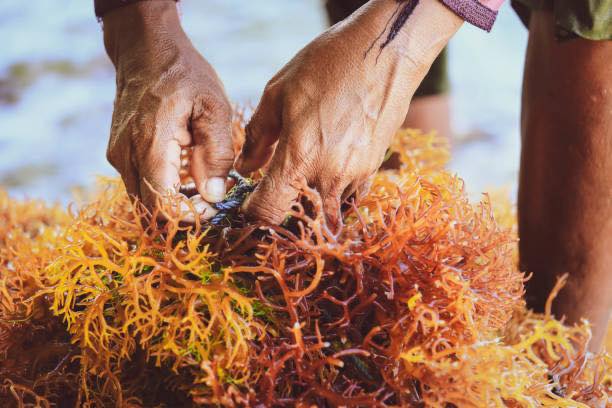Zanzibar is embracing a transformative approach to its marine resources, with President Dr. Hussein Mwinyi at the forefront of efforts to enhance the island’s seaweed sector.
Recognizing the industry’s potential, the government is committed to not only increasing production but also adding value to seaweed products.
This initiative is central to Zanzibar’s blue economy agenda, which aims to utilize marine resources sustainably while driving economic growth.
The seaweed industry, which employs nearly 99% women, plays a crucial role in Zanzibar’s socio-economic landscape.
Traditionally, seaweed farming has been a labor-intensive activity with limited financial returns for the farmers. However, President Mwinyi’s administration is determined to change this narrative by investing in modern techniques and technologies that can improve the quality and marketability of seaweed.
The goal is to ensure that the benefits of the industry are equitably shared among the farmers and contribute significantly to the national economy.
Importance of international collaboration
In a recent meeting with the European Union (EU) Ambassador to Tanzania, Christine Grau, President Mwinyi underscored the importance of international collaboration in advancing Zanzibar’s seaweed sector.
The EU’s support is seen as pivotal, particularly in areas such as training, provision of modern equipment, and the development of a comprehensive value chain.
This partnership is expected to elevate the quality of Zanzibar’s seaweed, making it more competitive in international markets and increasing foreign exchange earnings.
The focus on value addition is not merely about improving the economic returns from seaweed; it is also about empowering the women who dominate this sector.
By enhancing the processing and packaging of seaweed products, the government aims to create more job opportunities and increase the income of these women, thereby contributing to gender equality and poverty reduction in Zanzibar.
Looking beyond traditional markets
Furthermore, President Mwinyi is looking beyond traditional markets and exploring new avenues for collaboration. During a separate meeting with the Indian Ambassador to Tanzania, Shri Bishwadip Dey, discussions centered on strengthening bilateral relations between Zanzibar and India, with a particular focus on technological and educational exchange.
A significant outcome of this partnership is the establishment of a branch of the Indian Institute of Technology (IIT) Madras in Zanzibar, a move that is expected to significantly boost the island’s technological and academic capabilities.
This academic collaboration is seen as a game-changer for Zanzibar, providing local students with access to world-class education in science and technology without leaving the island. It also positions Zanzibar as a hub for technological innovation in the region, attracting students and researchers from across Africa and beyond.
In addition to educational ties, tourism remains a key area of focus in Zanzibar’s relations with India. President Mwinyi has expressed a strong desire to attract more Indian tourists to the island, recognizing the potential of this market. While Zanzibar already enjoys a steady influx of tourists from Eastern Europe and other regions, tapping into the Indian market could provide a significant boost to the local tourism industry.
Ties with India
The longstanding diplomatic relationship between Tanzania and India, which dates back to 1962, provides a solid foundation for these new initiatives. Over the years, India has been a consistent partner in Zanzibar’s development, contributing to various sectors, including water, health, and education.
The deepening of these ties, particularly through the establishment of the IIT Madras campus and the potential increase in Indian tourism, is expected to further strengthen the bond between the two nations.
In conclusion, under President Mwinyi’s leadership, Zanzibar is making significant strides in harnessing its marine resources and fostering international collaborations to drive sustainable development.
The focus on the seaweed sector, combined with educational and technological advancements, positions Zanzibar as a key player in the region’s blue economy, with the potential to significantly improve the livelihoods of its people.








